The Samsung SSD 830 Review
by Anand Lal Shimpi on September 24, 2011 1:02 AM EST- Posted in
- SSDs
- Storage
- Samsung
- pm830
- Samsung SSD 830
Random Read/Write Speed
The four corners of SSD performance are as follows: random read, random write, sequential read and sequential write speed. Random accesses are generally small in size, while sequential accesses tend to be larger and thus we have the four Iometer tests we use in all of our reviews.
Our first test writes 4KB in a completely random pattern over an 8GB space of the drive to simulate the sort of random access that you'd see on an OS drive (even this is more stressful than a normal desktop user would see). I perform three concurrent IOs and run the test for 3 minutes. The results reported are in average MB/s over the entire time. We use both standard pseudo randomly generated data for each write as well as fully random data to show you both the maximum and minimum performance offered by SandForce based drives in these tests. The average performance of SF drives will likely be somewhere in between the two values for each drive you see in the graphs. For an understanding of why this matters, read our original SandForce article.
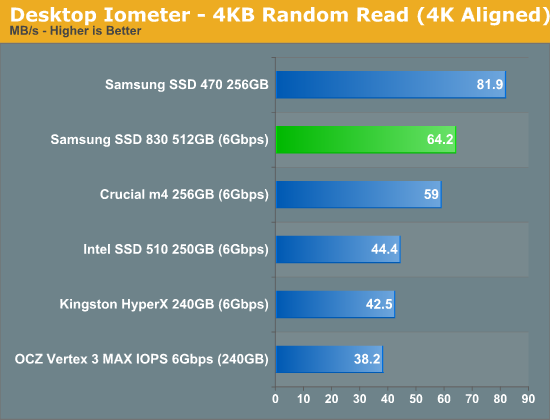
Just as we saw in Crucial's move to the m4 it looks like random read speed actually dropped a bit between the SSD 470 and 830. And just as we mentioned before, most desktop workloads don't demand super high 4KB random read performance so if this move was done to improve the 830's behavior elsewhere then it is a worthwhile tradeoff. Even with the drop however the 830 delivers the fastest 4KB random read performance of any high-end drive we've reviewed.
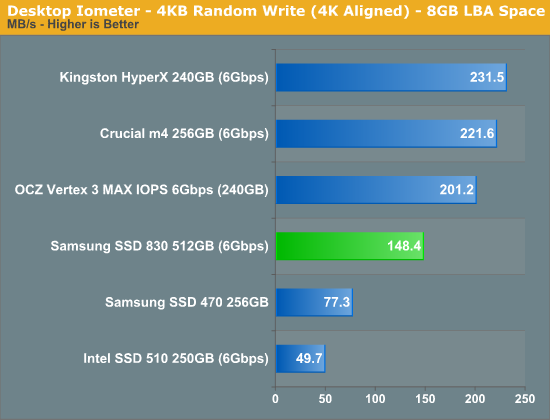
Random write performance has improved tremendously, although it's still noticeably slower than the SF-2281 drives and Crucial's m4. Similar to 4KB random read performance, there are diminishing returns beyond a certain level. Intel tends to have the right idea in how best to deal with random writes: work slower but clean up along the way, vs. write as fast as possible and rely on TRIM/idle garbage collection to improve performance later on. I've become wary whenever I see ultra high 4KB random write performance because it usually means that fragmentation can be a problem over time.
SandForce's numbers are high here because the workload is easily compressible, which is usually the case for desktop random writes as they tend to be table updates.
Many of you have asked for random write performance at higher queue depths. What I have below is our 4KB random write test performed at a queue depth of 32 instead of 3. While the vast majority of desktop usage models experience queue depths of 0 - 5, higher depths are possible in heavy I/O (and multi-user) workloads:
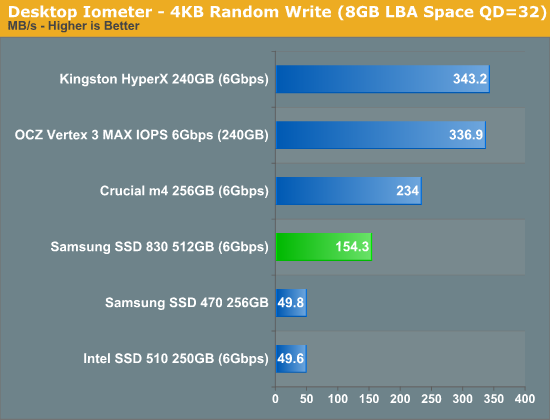
We don't see huge scaling with increasing queue depths from any of these drives really, with the exception of the SandForce solutions. Remember for the SF-2281 extra IO doesn't actually result in more writes to NAND, just a higher compression ratio which results in better performance with very little added work. I suspect SandForce's controllers could do very well in high load enterprise environments as a result. I've been working on an enterprise workload suite to figure that out...
Sequential Read/Write Speed
To measure sequential performance I ran a 1 minute long 128KB sequential test over the entire span of the drive at a queue depth of 1. The results reported are in average MB/s over the entire test length.
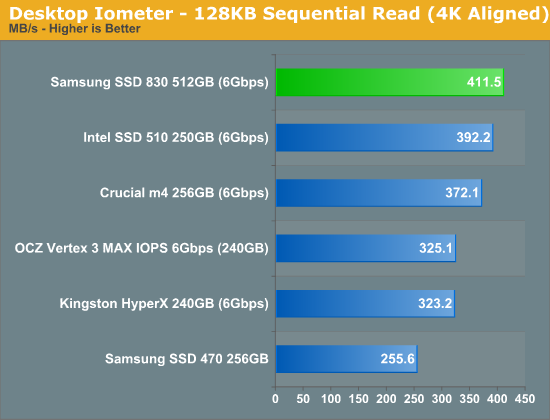
Although there are diminishing returns for ultra high random read/write operations on a desktop system, large sequential reads still scale quite well. If you do any amount of large file copying from your SSD to another SSD or file server you'll want to pay attention to these numbers here. Samsung manages to dethrone Intel at the top of our charts here with a very respectable 411.5MB/s.
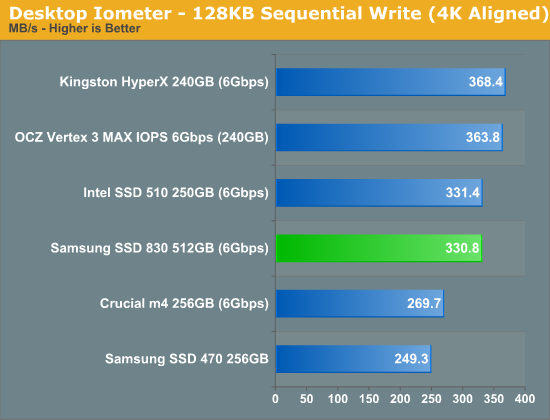
Sequential write speed is also still very important, again for those large file transfers. Despite the importance of random read/write IO the majority of desktop access patterns are still governed by sequential throughput. For an SSD to truly excel it needs good performance in all four of these categories. Thankfully for Samsung's sake, the SSD 830 delivers.










99 Comments
View All Comments
johan851 - Saturday, September 24, 2011 - link
Great article! I'm a little curious, though, as to why you prefer a drive to garbage collect in real time rather than cleaning up after the fact. While I think I sympathize with the idea of improving worst-case performance at the expense of the average, which essentially gives users a less bumpy ride, aren't most typical desktop usage scenarios full of idle disk time?I like the emphasis on Anandtech on what actually matters in real world scenarios, but it seems that your complaint on this particular matter is very much the opposite. The typical desktop user isn't going to fill the drive with writes and then immediately demand super high performance - at least I can't think of a desktop usage situation that would exhibit that pattern. I work on my computer for a few hours and then it sits for a while. Given that the average user idles their disk constantly, doesn't cleaning up while idle provide higher average performance in the long run?
Anand Lal Shimpi - Saturday, September 24, 2011 - link
You are correct, for mostly idle workloads it should work fine. The problem is with a mostly full drive, it's possible that during bursty periods of work the performance will degrade to the point that you'd notice it. Hopefully it'd correct overnight but if you sleep your machine then it prolongs the process.I'd argue that most desktop workloads won't show the difference between 150MB/s and 100MB/s in 4KB random writes. I'd much rather have the latter and enjoy a more consistent user experience.
I do understand Samsung's argument that delaying garbage collection would seem to work for mostly idle scenarios, I just don't believe there's any downside to doing it the opposite way and only potential upside there.
Take care,
Anand
johan851 - Saturday, September 24, 2011 - link
Fair enough. Thanks for the reply and another awesome SSD article.leexgx - Sunday, September 25, 2011 - link
but even worst case its still 200x faster then an HDD do same work load, you not notice it unless your benchmarking itdid the disk have any stuttering issues when it was very badly degraded? (access time was reported as 0.1 in that test)
i did not see it but do you no longer do access time tests any more
marraco - Saturday, September 24, 2011 - link
Even if the common user don't use it, is important to know.And the drive is not just for the common user.
Malih - Monday, September 26, 2011 - link
Well, enthusiast gamers usually use SSD as game installation disk, and they would (mostly) play games right away after installing or downloading from Steam.So 'on-write-garbage-collection' is preferable in this case.
Beenthere - Saturday, September 24, 2011 - link
As any number of owner reviews can attest the Samsung 470 was a nightmare of problems for many people concerning compatibility and in some cases reliability. The 830 looks to be a nice performance improvement but if the compatibility, garbage cleaning and installation/reliability issues haven't been resolved, these drives like the majority of current MLC based SSDs are simply not ready for Prime Time. Samsung's customer support appears non-existent. Consumers are being used as unpaid Beta testers IMO.kmmatney - Saturday, September 24, 2011 - link
I've had no problem with my Samsung 470 - I can attest that its a reliable drive.xype - Saturday, September 24, 2011 - link
I have a 470 that I installed in my 2009 MacBook Pro. Works like a charm, installation happened without problems, seems reliable (so far). *shrugs*jwilliams4200 - Saturday, September 24, 2011 - link
He wrote "any number" of reviews. Zero is a number.